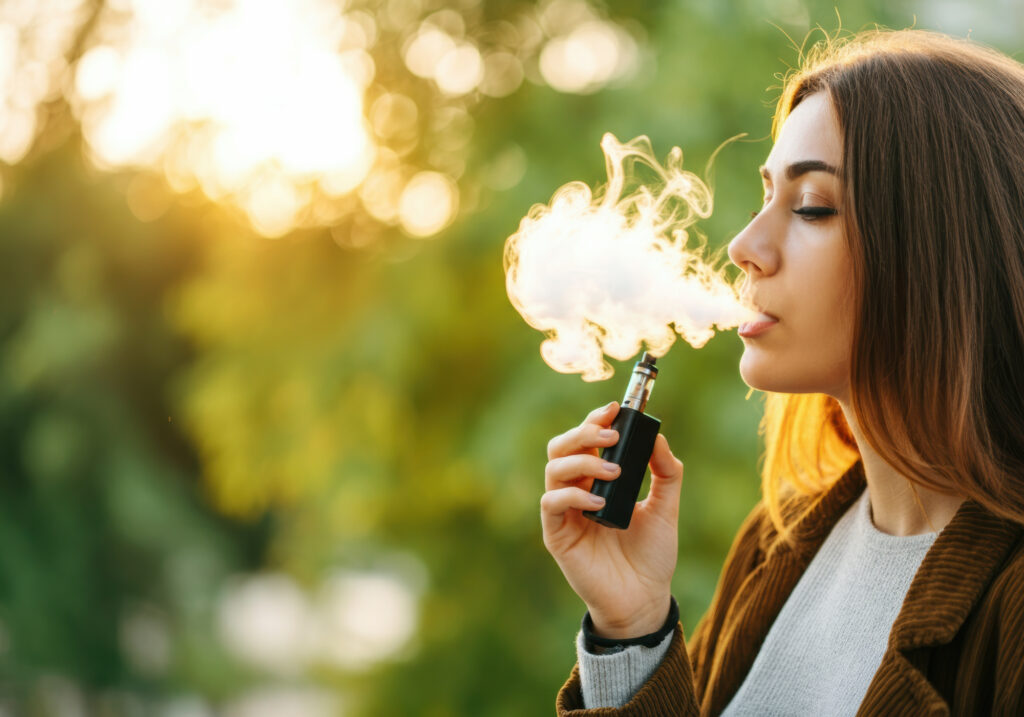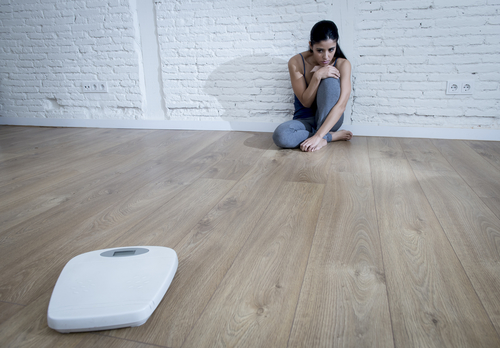Pregnancy is a time when many people reevaluate their habits to prioritize their baby’s health. While most are aware of the dangers of smoking, vaping nicotine during pregnancy is a newer concern that raises many questions. Can you vape when pregnant? Are there vaping alternatives for pregnancy? We’re here to answer these and other pertinent questions to help you understand the risks and make more informed decisions.
Next Steps
If you’re struggling with addiction, you don’t have to face it alone. At Casa Capri, we offer expert, women-centered care in a supportive and nurturing space—designed by women, for women. Our team is here to help you heal with purpose and connection.
Call our admissions team for a free, confidential chat—we’ll even check your insurance and estimate any costs upfront.
What is Vaping?
Vaping is the act of inhaling vapor produced by an electronic cigarette (e-cigarette) or other vaping device. These devices heat a liquid (often called e-juice or vape juice) to create an aerosol that users inhale. Most e-juices contain nicotine, a highly addictive substance that can harm both the user and their developing baby during pregnancy. Even small amounts of nicotine can affect fetal brain and lung development, leading to long-term consequences.
Vaping without Nicotine
Some vaping products are marketed as nicotine-free. While these may seem safer, they are not without risks. Nicotine-free vapes still contain harmful chemicals, such as propylene glycol, vegetable glycerin, and flavoring agents. Research suggests that these substances can irritate the lungs and potentially harm a developing fetus. Is zero nicotine vape safe for pregnancy? While it eliminates the risks of nicotine addiction, it does not remove exposure to other harmful substances.

Harmful Chemicals in Vaping Devices
E-cigarettes contain more than just nicotine. Even devices marketed as “clean” or “safe” can emit toxins such as:
- Heavy metals like lead and nickel, which can harm fetal development.
- Volatile organic compounds (VOCs) that can irritate the respiratory system.
- Flavoring agents, such as diacetyl, which may cause lung damage.
These chemicals can cross the placenta, exposing the baby to potential developmental dangers, and can cause other vaping while pregnant risks.
The Differences Between Vaping vs. Cigarettes
Vaping and smoking cigarettes both pose significant risks during pregnancy, but they do so in different ways. Cigarettes contain thousands of harmful chemicals, including tar and carbon monoxide, which directly damage the lungs, restrict oxygen flow, and impair the development of the placenta.
Nicotine in cigarettes is one of the most harmful substances, linked to a higher risk of premature birth, low birth weight, and birth defects. Vaping, while often seen as a less harmful alternative, is not without its risks. E-cigarettes also contain nicotine, which can limit blood flow to the placenta, potentially leading to developmental issues or preterm birth.
Additionally, many vape liquids contain other chemicals, including flavorings that can be toxic when inhaled. While vaping may expose a pregnant woman to fewer toxins than smoking cigarettes, it is still unsafe for both the mother and baby. The safest choice is to avoid both smoking and vaping during pregnancy to protect the health of both mother and child.
The Risks: Vaping While Pregnant
Using vape products during pregnancy carries significant risks, primarily due to the harmful effects of nicotine on both the parent and baby. Nicotine can compromise vascular flow and oxygen supply to the baby, leading to impaired fetal development, including low birth weight and premature birth. Additionally, exposure to nicotine during pregnancy has been linked to neurological issues, such as attention disorders and cognitive delays in children. The chemicals in vaping devices also pose a threat to the baby’s developing lungs, increasing the likelihood of respiratory complications.
Is Vaping During Pregnancy Safe?
Engaging in vaping when pregnant is not considered safe due to the harmful effects of nicotine and other chemicals. For those using nicotine-free products, the risks are reduced but not eliminated. Therefore, the question, “Can you vape when pregnant?” results in strong recommendations against doing so. Even low or no nicotine options can still expose the developing baby to potentially dangerous substances.
Vaping Alternatives for Pregnancy
Nicotine Replacement Therapy (NRT)
If you’re seeking pregnancy-safe vape alternatives, consider nicotine replacement therapy (NRT). These options, such as nicotine gum or patches, provide controlled doses of nicotine without exposing you or your baby to the harmful chemicals found in vape products. Always consult a healthcare provider before starting NRT to ensure it’s appropriate for your situation.
Behavioral Therapy
Behavioral therapy can be an effective tool for quitting electronic cigarette use while expecting. These programs focus on identifying and managing the triggers that lead to cravings, providing strategies and support to help you make healthier choices.
Healthy Substitutes
Incorporating healthy substitutes into your routine can also help manage cravings. Chewing sugar-free gum, drinking herbal tea, or practicing mindfulness techniques are simple, safe ways to reduce stress and distract from the urge to vape.
For more information, read our article on vaping while pregnant.

How to Safely Quit Nicotine & Vaping While Pregnant
Quitting nicotine and vaping during pregnancy can be challenging, but it is crucial for the health and well-being of your baby. One important step is to seek professional support by reaching out to your healthcare provider or an addiction specialist, who can offer personalized guidance tailored to your needs. Moreover, finding support groups can be invaluable, as connecting with others who are facing similar challenges provides motivation and accountability. When asking the question, can you vape when pregnant, the ultimate answer is about your health and the health of your unborn child. So, it’s best to educate yourself about the risks of nicotine and vaping so you can further reinforce your commitment to quitting, as understanding the potential harm to both you and your baby strengthens your resolve.
For additional support, explore our resources on being pregnant and addicted.
If you’re struggling to quit vaping or nicotine during pregnancy, Casa Capri Recovery in California is here to help. Our compassionate team specializes in guiding women toward healthier choices for themselves and their families.
Next Steps
If you’re struggling with addiction, you don’t have to face it alone. At Casa Capri, we offer expert, women-centered care in a supportive and nurturing space—designed by women, for women. Our team is here to help you heal with purpose and connection.
Call our admissions team for a free, confidential chat—we’ll even check your insurance and estimate any costs upfront.
FAQs About Vaping Nicotine While Pregnant
When should you stop vaping while pregnant?
It’s best to stop vaping as soon as you find out you’re pregnant. Vaping during any stage of pregnancy can pose risks to both you and your baby. The earlier you stop, the better it is for your health and the health of your baby.
Can vaping cause birth defects in the future?
There is no direct evidence linking vaping to birth defects, but nicotine and chemicals found in vape liquids can affect fetal development and increase the risk of complications, such as low birth weight or preterm birth. These risks could indirectly affect long-term health.
Is vaping better than smoking when pregnant?
While vaping is generally considered less harmful than smoking when pregnant – vaping is still not a viable option during pregnancy. Both smoking and vaping expose the baby to harmful chemicals, including nicotine, which can impact brain development and lead to complications like premature birth or low birth weight. The safest option is to quit both smoking and vaping.
At what stage of pregnancy does smoking affect the baby?
Smoking can affect the baby at any stage of pregnancy, but it’s most harmful in the first trimester when the baby’s organs are developing. Nicotine and other chemicals in cigarettes can disrupt fetal development, leading to issues like birth defects, low birth weight, or preterm birth.
Can nicotine in vaping harm my baby during pregnancy?
Yes, nicotine is harmful to a developing baby. It could hinder circulation to the placenta, reducing oxygen and nutrients available to the baby, which can lead to complications like low birth weight, premature birth, and developmental issues.
Are e-cigarette flavors safe during pregnancy?
No, the chemicals in e-cigarette flavors are not safe for your baby. While some flavorings are considered safe for ingestion, inhaling them can be harmful to both you and your baby. These chemicals may irritate the lungs or cause long-term harm to fetal development.
Does vaping increase the risk of miscarriage?
Vaping, especially if it contains nicotine, may increase the risk of miscarriage. Nicotine can constrict blood vessels and affect the placenta, leading to complications that could increase the risk of early pregnancy loss.
Can vaping cause low birth weight?
Yes, nicotine from vaping can obstruct the flow of blood to the placenta, which may cause the baby to receive less oxygen and nutrients. This can lead to low birth weight, which increases the risk of health problems at birth.
How does vaping during pregnancy affect brain development?
Nicotine and other chemicals in e-cigarettes can interfere with brain development, potentially leading to learning and behavioral issues later in life. The developing fetal brain is particularly vulnerable to the effects of nicotine, which can impact memory, attention, and cognitive function.
Is there any safe amount of vaping during pregnancy?
No. There is no safe amount. Even small amounts of nicotine and other chemicals can pose risks to your baby, so it’s best to quit vaping completely for a healthier pregnancy.



